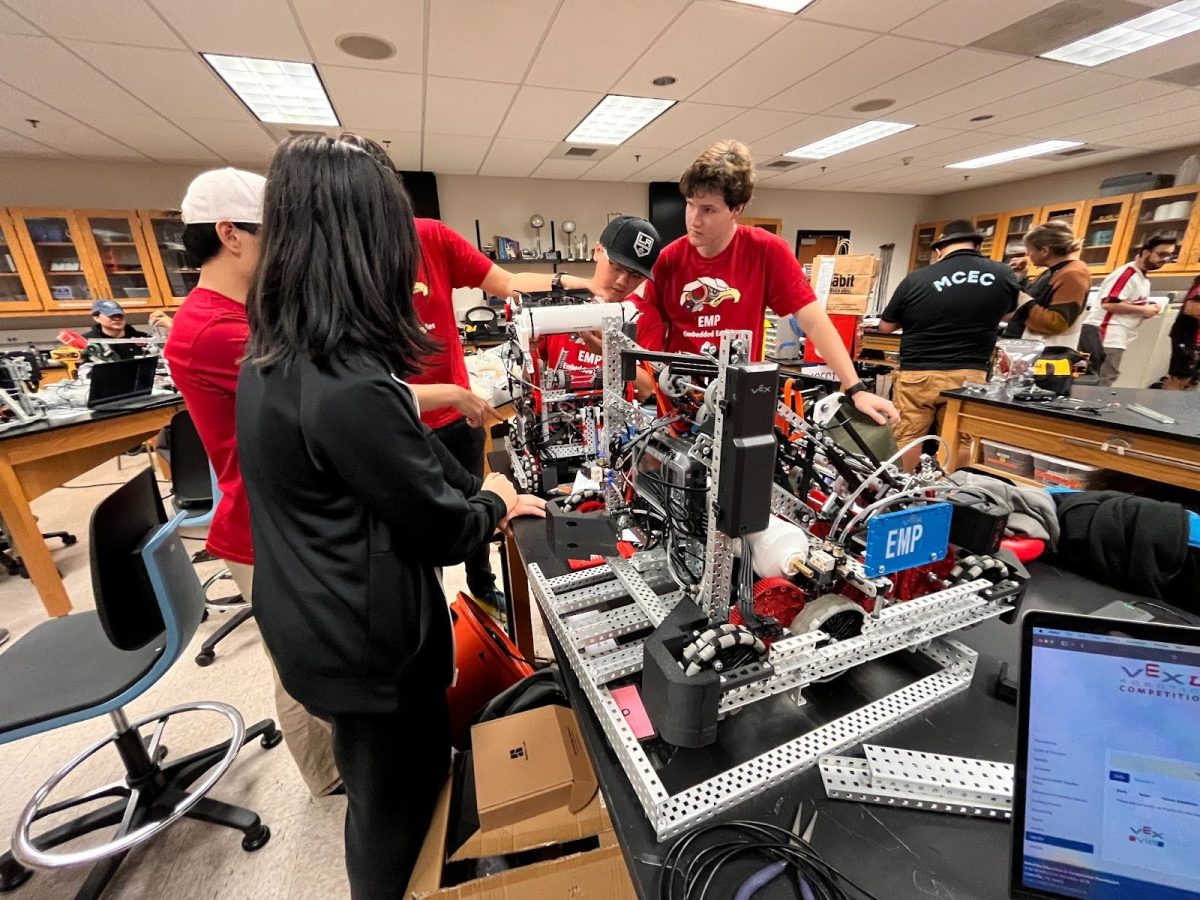On Mar. 4, Biola’s robotics team announced that they were headed to the VEX U Robotics World Championship in an Instagram post. It also stated that the team was successful at the weekend’s competition earlier at California Polytechnic State University in San Luis Obispo on Mar. 1. The post announced that Biola’s team won the Design Award, which qualified them for the World Championship, and that they came in second place for the Skills event.
THE JOURNEY
Biola’s robotics team was started as a robotics club in the fall of 2024 with Jaran Mann, a sophomore robotics major, as its president. Mann stated that the team’s goal was to make it to the international VEX U Robotics Competition.
In order to get there, however, the robotics team not only had to do well at competitions hosted by the Robotics Education & Competition (REC) Foundation, but a variety of other areas as well.
Jaran Mann, sophomore robotics major and president of the Robotics Club, described the steps that the team took to succeed.
“Qualifying for the World Championship was almost a year-long process. We had to fully plan, design, program, test and improve two robots that could complete the tasks given to us in this year’s competition. We traveled to two regional competitions (one hosted by Mount San Antonio College, and one by Cal Poly San Luis Obispo), and pitted our robots against veteran teams, many of which had higher quality robots, along with much more experience,” said Mann.
He added that the team took measures to be prepared for these competitions, including creating strong strategies to help gain an advantage to qualify for the World Championship.
“We expanded the length of our meeting times for each week and continuously practiced both the programmed and driver runs of our robots,” said Mann. “I made sure we had two meetings nearly every week, and I gave members positions and specific roles to fill to ensure that the club ran smoothly. Building robots is not everything, as we have many other things to account for, such as finances, outreach and documentation.”
He explained how the robotics competitions operate, noting that there were two main events.
“The first one includes a series of qualifier matches that each team competes in. In a match, teams try to score more points with their robots than the other team within a set amount of time. The team that scores more points wins the match,” said Mann. “More wins grants a higher ranking for the tournament-style elimination rounds. Whoever wins the tournament gets the Tournament Champion Award. Most teams focus on optimizing their robots for these matches, as this award automatically grants a qualification for Worlds.”
Mann revealed that his team decided to concentrate their efforts on the second event, which is called “Skills.”
“Skills runs are more like time-trial runs, where one team’s robots try to score as many points as they can in a one-minute period. There are autonomous runs, where the robots run on their own with preset programs, and there are driver-control runs, where team members drive the robots,” said Mann. “Whichever team scores the most points wins the Skills Champion Award, which may also grant a Worlds qualification. There are other awards that can be won, such as the Excellence Award and the Design Award, which is what our team won.”
PERSONAL INVESTMENT
Robotics teams are typically expensive to start and maintain, not even considering the cost for entering competitions, traveling, transporting the robot and equipment and other factors.
Mann described the process of securing the funding needed for the robotics team.
“At first, we used money that was provided for the Summer Engineering Internship (SEI), which is what we started our building process through. Later down the line, we presented our robot projects to the Professional Advisory Board of [Biola’s] School of Science, Technology & Health (SSTH), and they granted us $6,000 for our robots, which we used all the way until the competition,” said Mann. “We also received some funding from Biola’s Office of Campus Engagement (OCE).”
VISION FOR THE FUTURE
Mann expressed his confidence in the robotics team and his hope for the World Championship, which will be held at the Kay Bailey Convention Center in Dallas, Texas from May 6–14.
“With us qualifying for the World Championship in just our first year, I believe that this team will perform very well in Worlds,” said Mann. “Our main goal is to get Biola on the map, to get people to recognize and consider joining Biola’s new and growing Robotics Program, as well as our team.”
He also extended an invitation to the Biola community.
“We are always looking for new members to help out with our robot design process, in terms of both building and coding. Everyone is welcome, and we will teach you everything you need to know to contribute to our team,” said Mann.
He encouraged those interested in robotics to look into this year’s robotics competition and awards. The VEX U Robotics World Championship will host live streams and videos on VEX TV.






